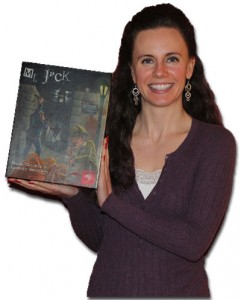2 Player Reviews – Mr. Jack with Chris & Valerie – Boardgamery
Mr. Jack
QuickFacts:
Board Game Geek: Here
Dice Tower Review: Here
Plano Box Size: Not necessary
Number of players: 2
Val’s ‘Gamer Intensity’ Rating:
Hey there! We’re Chris & Valerie and we like to play games together. Unfortunately, it’s not always easy for us to find others to play with – this means we often have to pay special attention whether the selected game is a good fit for two players. Here we explore these games and help you decide the all-important question, “Can this game work well with just two players?”
Disclaimer: Thus far we played four games of Mr. Jack, two as each role. Admittedly it’s not enough to be a completely credible source, but the level of exposure was enough to form a semi-educated opinion.
In each of the four games Valerie and I played Jack was caught by the 5th (of 8) rounds. What is appealing about the game is the duality of the play-style. When playing as Jack it’s a strategy game with hints of chess piece prediction, thus strategy minded players will enjoy that role. When playing as the cadre of good guys the play style is a bit less strategy (with said chess-piece mechanic) and a bit more deduction. Thus your Clue players will enjoy that role.
Quick elements of the game:
- By process of elimination you ultimately deduce whom Mr. Jack is, as he’s masquerading as one of the characters. That is done by getting people to be ‘seen or unseen’ by either people or street lights. If Mr. Jack is seen at the end of a round then all the unseen players can’t be Jack by process of elimination. While you can guess at any time whom Mr. Jack is, if you’re wrong you lose.
- Each character has a special ability such as moving street lights, moving man hole covers (think secret paths ala Clue), moving one of the two police barricades that block one of four exits, swapping positions with another player, or moving another player along side your own. With the exception of two characters, you must use their abilities like it or not.
- You choose four of the eight characters to move each round, with the next round using the other four characters. After an even set of rounds the character cards are shuffled and a different combination of four characters is selected. (Thus you can never confidently say, “I moved Mr. Watson last turn so he can’t come up next turn.”)
- Each round the movement of the four characters changes, at first Detective moves a character, then Jack moves two back to back, then Detective moves the last. Next turn Jack moves first and last, with Detective back to back in the middle. (Thus you really need to plan your sequence of moves like, “move the manhole with Character 1, warp Jack through man hole to escape with Character 2.)
![]() Chris’s Thoughts
Chris’s Thoughts
Because of these elements I feel this is where the game falls apart. At the top I mentioned this was a strategy and deduction game. You cannot properly deduce or strategize when three of the four game elements are based off randomization. Much like chess, where you need to be able to predict a few moves in advance and at times control your opponents movements, you need to do the same here. Unfortunately because you cannot predict which cards are coming up for use, can’t chain usable characters back to back efficiently, and are forced to use abilities which further randomize the circumstances of the game, you cannot deploy an effective strategy.
Also, the game is really won in the first 2-3 rounds as the amount of street-lights in the district make it almost impossible to not use a binary (50/50) elimination process. By the end of your 3rd turn you’ve narrowed down whom Mr. Jack is to two or three characters. One of our games I had it down to two after the first turn. Sadly I then had to dork around for four turns to get one ‘lit’ and one ‘unlit’ to reliably catch and accuse the correct person.
Valerie’s Thoughts![]()
The game (as noted by the Dice Tower review), at least initially, is easier for the detective to win rather than Jack – in fact, it seems fairly stacked against Jack escaping. Each of the four times we played, the detective won, and as Chris had mentioned, we both took on the roles twice and figured out very early on who Jack was. In most cases it was just about as hard to catch Jack as it was to deduce who he was.
Also, the initial set-up of characters is always the same. While ultimately based on character movement this changes quickly, I thought it made the game stale. Other suggested set-up options, especially ones with less lights or characters further from light sources and each other, would be a good addition.
I was slightly disappointed in the game, because I really like deduction/mystery/Clue-esque games. But because the roles of detective and Jack don’t seem evenly matched, it didn’t grab me as a “must-have”. I personally don’t think the randomization kills the game as much as Chris (I like having my hand forced to some extent by the draw of the cards) but I do think the idea of killing of a character each turn (see suggested House Rules below) would make the game more difficult for the detective.
Some suggested House Rules
What the game needs is more deduction and character elimination.
- Reduce the randomization. Mr. Jack should kill off a character every other turn (thus removing a randomizing element to the game and making it harder to physically catch).
- Remove one light at the start of the game so the 50/50 deduction is less applicable.
- The detective should be able to get more alibi cards beyond Sherlock Holmes ability or there should be some other element which enhances the deduction element of the game.
Our Summary
Ultimately we enjoyed the experience and will give it a few more run-throughs. Perhaps the official website has published an errata. Would I buy the game? No. The fact that there is so much randomization in what should be a strategy and deduction game weakens its effectiveness for me. Valerie agreed though amended that a few more play-throughs could reveal patterns which a more sensitive player could recognize and accurately employ.
Thanks for reading!
~Chris & Valerie





